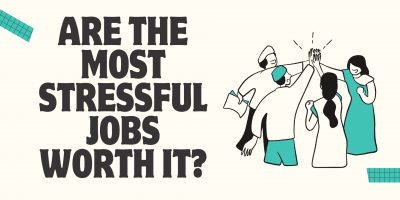
Are the Most Stressful Jobs Worth It?
Is a high-earning job worth it if you don’t have enough free time to enjoy its benefits?


AM, BCD, LCSW at Perspectives

Co-Owner of Damien McEvoy Plumbing

Managing Director at H-Training

CEO of PalaLeather
Depression in the United States is on the rise. Yet, this mental health disorder remains overlooked in the workplace, where we spend much of our lives.
According to research from Boston University, after the pandemic struck, depression rates jumped from 8.5% to 32.8% in 2021, affecting almost one in every three U.S. adults. That same year, the American Psychological Association released a report indicating that 59% of employees also experience work-related stress, and 87% believe employers can take action to help them with their mental health.
Struggling with a mental illness goes beyond feeling sad or unmotivated, and it’s not something that people can leave at home before they go to work. Chronic depression, stress, and anxiety, when left untreated, will ultimately creep into every aspect of a person’s life.
Between a heavy workload, financial stress, and a poor working environment, the workplace can significantly contribute to declining mental health. Or it can be the main instigator.
In fact, according to Bernie Dyme, AM, BCD, LCSW at Perspectives, “Now more than ever, the need for mental health assistance is growing. We need to take advantage of this growing need and willingness of people to admit they need help by making it easy for them to seek out and get it.
The many choices out there with respect to apps, AI, and digital support can make it very confusing for most people.
Top-tier EAPs are a great hub for assistance. Perspectives, for example, has a triage process that combines a new, highly effective, and validated digital assessment tool which, combined with a caring counselor at the point of access, greatly enhances the likelihood of finding the right help.”
The difference between struggling with depression at work and work-induced depression opens a much-needed discussion.
Since it’s a delicate subject requiring the utmost sensitivity, this Shortlister article will analyze both concepts. Ultimately, recognizing and differentiating between depression at work and work-induced depression can help employers choose the best strategies to improve their employees’ well-being.
The National Institute of Mental Health defines depression as a common but serious disorder that affects how a person feels, thinks, and acts. However, there isn’t a single way of describing it. The condition can manifest in many ways, from losing energy and interest to feeling sad, hopeless, and suicidal.
Yet, depression at work often goes unnoticed.
Usually, people with a mental illness mask or internalize it out of fear of being treated differently by their coworkers or employer.
However, depending on the severity of the conditions, at some point, it will affect the individual’s ability to do their job effectively and maintain the usual level of productivity. Research shows that depression reduces cognitive performance 35% of the time and the ability to perform physical tasks 20% of the time. Another review of research articles reveals that unemployment, work absence, and at-work performance deficits are all more prevalent in people with depression.
Therefore, management, HR, and other employees should look for changes in work motivation, poor concentration, or increased absenteeism among their colleagues.
Additional ways to recognize symptoms of depression at work are through mood changes, like sadness, irritation, disinterest, and even substance abuse.
Since it’s such a widespread condition, chances are most companies have or will have an employee suffering from this mental illness. However, the reality is that employers should educate themselves and their workforce on the prevalence and impact of depression at work to create a safer environment for people with this condition.
Apart from the obvious financial losses from impaired performance, reduced workplace morale, and higher turnover rates, employers willing to invest in their organization’s human capital will most probably be the ones that win the talent war.

According to the CDC, in 2019, one in five adults (18.5%) struggled with depression. This number is rising post-pandemic. Additionally, eight in ten reported difficulty with work and other activities.
It’s no surprise that depression affects work, as it’s a hidden battle many are fighting daily. Plus, the fast-paced and competitive nature of the modern workplace, coupled with an increased workload, long hours, and high-stress levels, can exacerbate the disorder.
Post-covid workplace burnout is rising globally, further affecting the pervasiveness of depression in the workplace. In fact, a survey by Future Forum Pulse found that it affects over 40% of the workforce.
While the numbers look gloomy, being mindful of mental health conditions and seeking or offering help can go a long way in their treatment. By acknowledging it and taking proper measures to address depression, employers can create a healthier work environment that benefits everyone.
Statistics reveal that depression costs $44 billion in lost productivity annually.
It’s also the leading cause of disability worldwide, and mental health is the second most common workplace concern, right after family problems.
Other statistics show that:
But there’s a silver lining.
The State of Mental Health in America 2021 report shows that the number of people seeking professional treatment for depression and anxiety is dramatically rising. It means that despite the ongoing stigma, people are becoming more aware of the condition and actively seeking help.
However, while these statistics give a general idea of the scope and impact of depression in the workplace, another underlying condition threatens the well-being of workers and organizations – work-induced depression.
Work-induced or occupational depression refers to the type of depression that is triggered only by factors related to a person’s work environment. Usually, it stems from prolonged and unresolved stress, pressure, or dissatisfaction at work. Although it seemingly sounds less severe, it’s still a form of clinical depression that significantly impacts an individual’s mental, physical, and emotional well-being.
One study published in the International Archives of Occupational and Environmental Health points out potential job stressors that can contribute to depression, including:
Organizational culture and leadership can also cause work depression, anxiety, and certain high-stress professions like healthcare or high-pressure corporate environments.
Regardless of the causes, it’s crucial to note that this is a legitimate mental health condition and may require intervention and treatment. Therefore, employers should monitor any indications and signs of depression at work.
Recognizing a mental health condition in another person can be tricky. From the individual’s attempt to protect themselves from bias to how unspecific the symptoms are, one can completely miss it.
Some symptoms of depression at work include:
On their own, each of these symptoms is too common and could be related to many underlying health conditions. However, prolonged periods or exhibiting multiple symptoms can indicate a mental health disorder.
Now that we’ve briefly discussed both, let’s further differentiate between depression at work vs. work depression.
The first refers to a situation where a person will experience symptoms that are usually unrelated to their job, such as genetic predispositions, traumatic events, or personal life problems.
However, a stressful work environment could affect the condition and its symptoms.
On the other hand, work-induced depression is specifically caused or exacerbated by work-related factors like a heavy workload or a toxic organizational culture. The condition is often related to work burnout, and if left untreated, it can lead to chronic stress, anxiety, and, eventually, symptoms of depression.
Matt Little, Co-owner and Content Manager at Damien McEvoy Plumbing, further explains the difference between the two, saying:

Despite their differences, both are a significant concern for the well-being of employees.
There’s considerable research on depression, anxiety, and other mental health disorders. The same thing cannot be said for occupational depression.
However, we do know where it usually stems from.
Understanding its triggers and symptoms can help people identify and address work-induced depression before it grows into an even bigger mental wellness issue.
It’s easy to confuse work-induced depression with elevated levels of work stress and anxiety. Although they often coexist, these three concepts are not the same.
While depression can be defined as a disorder, work stress is a state of mental or emotional strain, usually due to pressure.
On the other hand, occupational anxiety often takes the form of uneasiness or fear related to work tasks, including the fear of failure, criticism, or making mistakes.
Although the symptoms and triggers often overlap, there are some distinctions between these three:
|
Work Depression |
Work Stress |
Work Anxiety |
|
Often, occupational depression manifests as
persistent sadness, loss of interest, difficulty concentrating, feelings of
worthlessness, and overall idleness towards most things. Many factors, including prolonged work
stress, burnout, dissatisfaction, and other personal or environmental
factors, cause work depression. |
Workplace stress is mainly characterized by
irritability, fatigue, difficulty sleeping, muscle tension, changes in
appetite, headaches, increased absenteeism, decreased job satisfaction, etc. High workload and job demands,
lack of control at work, a tense working environment, tight schedules, poor
life-work balance, etc., usually cause work stress. |
Work anxiety is best described through
nervousness, restlessness, racing thoughts, rapid heartbeat, difficulty
concentrating, gastrointestinal issues, and avoidant behavior at work. Occupational anxiety is caused by
uncertainty about work-related outcomes, fear of job loss, negative feedback,
performance anxiety, fear of public speaking, etc. |
To mitigate the effects of the pandemic, a rapid evolution of the workplace made remote working a common practice for millions of people. While this new way of working has many benefits, it also comes with challenges.
However, when it comes to the correlation between working from home and depression, experts can’t seem to agree.
For example, according to a 2022 survey by the U.S. Chamber and RSM, 64% of middle market executives believe that remote work harms their employees, an increase from 55% in 2021. Moreover, 73% reported isolation among workers, an increase from 68% the previous year.
Other studies point out the benefits of working from home.
For example, FlexJobs, in association with Mental Health America, conducted a survey where 80% of respondents believed flexible work could help them better care for their mental well-being.
The results are inconclusive.
Nevertheless, despite the convenience of remote work, establishing clear boundaries between work hours and personal time can often be challenging. This can take a toll on a person’s mental health, creating an inability to disconnect from work and increasing the risk of burnout, social isolation, and loneliness.
In the era of working from home, employers and employees must work together to prioritize mental health, turning to strategies that range from staying proactive and seeking professional help to creating a healthy and supportive remote work environment with access to employee assistance programs (EAPs) and mental health benefits.
Coping with work depression demands a multifaceted approach, from changing habits and removing triggers to full-scale employer-implemented solutions.
Practicing self-care, professional treatment, and employee mental health programs are all good coping strategies and can improve the well-being of people struggling with anxiety, stress, and depression in the workplace.
Self-care practices as a coping strategy are the sole responsibility of the individual. They include:
As helpful as self-practice can be, sometimes it’s not enough. In such situations, the employee should turn to professional methods of treatment, including:
According to Ciarán Hourican, Managing Director at H-Training, “Patterning with a mental health organization to provide extra support for employees is a great option.
Having an external partner that employees can talk to can help them feel more comfortable talking through their problems and can help break down barriers that some people may face when seeking mental health services.
Employee assistance programs, providing free, confidential counseling, offering mental health days, and having coffee morning can really go a long way to help. Some larger companies may have internal programs that provide staff with easy access to mental health practitioners. Yet, even smaller companies can join together to give employees access to extra help when they need it.”
Finally, companies also have a legal and ethical responsibility to enable a safe and healthy work environment, which includes addressing mental health concerns through solutions like:
Luke Lee, Managing Editor at Ever Wallpaper, agrees that employers should implement flexible work arrangements and foster a supportive work environment and adds a few more strategies organizations can use, including:
Dealing with depression at work is a challenge on its own. But handling the stigma can be even more exhausting and counter-effective.
Whether it’s depression at work, work depression, anxiety, or stress, all can be equally challenging to overcome without a supportive and inclusive environment where individuals feel confident and safe to ask for help.
People who don’t understand tend to judge.
Therefore, the core issue with mental illness stigma is fear and judgment due to a lack of knowledge. This can result in stereotyping individuals as weak, dangerous, or crazy and trivializing the actual effect of these disorders.
Therefore, the first and main step to overcoming stigma is through education.
A survey from the American Psychological Association reveals that 33% of respondents are scared of people that suffer from a mental health disorder, and 39% admitted to viewing them differently. However, of those, 42% never had a diagnosis or knew someone with a mental illness, against 28% who did, proving that familiarity with such conditions can change how people view disorders.
On a more positive note, 87% believe a mental health condition is nothing to be ashamed of, and the majority also agree that it shouldn’t prevent people from living normal lives.

The circular economy is a new model of production and consumption that aims to keep resources in use for as long as possible. This involves designing products for durability, reusability, and recyclability.
Companies are increasingly adopting circular economy principles to reduce their environmental impact and save costs.
For example, Patagonia offers a repair service for its clothing, and some companies sell products as a service rather than selling them outright.
As a result, companies retain ownership of the products and ensure that they are recycled or reused at the end of their life.
Content Writer at Shortlister
Browse our curated list of vendors to find the best solution for your needs.
Subscribe to our newsletter for the latest trends, expert tips, and workplace insights!

Is a high-earning job worth it if you don’t have enough free time to enjoy its benefits?

Why do some organizations adapt under pressure while others collapse? The explanation often comes down to preparedness, not luck.

What types of resources can employers provide to lessen the burden of lonely individuals in the workplace?

From decreased productivity to poor workplace relationships – gain insights on recognizing, addressing, and mitigating the consequences of substance abuse at work.
Used by most of the top employee benefits consultants in the US, Shortlister is where you can find, research and select HR and benefits vendors for your clients.
Shortlister helps you reach your ideal prospects. Claim your free account to control your message and receive employer, consultant and health plan leads.